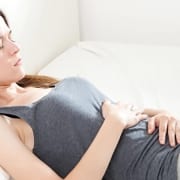Premenstrual Syndrome
It is estimated that premenstrual syndrome (PMS) affects up to 75 percent of women during their childbearing years. Approximately one to two weeks before a woman begins her menstrual cycle she may experience a wide range of uncomfortable physical and emotional symptoms. These symptoms generally disappear when menstruation begins.
Symptoms of PMS
 Typical symptoms of PMS include feelings of gaseousness, bloating, constipation, joint pain, acne, fatigue, headache, breast tenderness, food cravings, forgetfulness, mood swings, irritability, and emotional sensitivity.
Typical symptoms of PMS include feelings of gaseousness, bloating, constipation, joint pain, acne, fatigue, headache, breast tenderness, food cravings, forgetfulness, mood swings, irritability, and emotional sensitivity.
The first step in treating these symptoms is to adopt a healthy lifestyle. Making dietary changes, getting adequate sleep and adding regular exercise into your daily routine are all ways to alleviate symptoms.
If, after making these lifestyle changes, your symptoms persist, medical treatment may be necessary to manage the emotional and physical discomfort associated with PMS.
How We Can Help
At the Kaplan Center, our physicians have years of experience treating patients with conditions that can impact the quality of life.
At your first visit, your Kaplan Center physician will take time to explore the specific nature of your symptoms, and the overall status of your health. You’ll also be asked about therapies and medications you have tried in the past, and what has and hasn’t worked for you.
Your physician may also want to look at any possible hormone imbalances that may be contributing to your symptoms. Your physician will then spend time talking with you about your diagnosis and working with you to create a multi-dimensional treatment plan. A successful treatment plan should address your PMS and any possible underlying or co-existing conditions that may be causing or aggravating your symptoms.
Treatments may include:
- Hormone Replacement Therapy
- Acupuncture
- Herbal Remedies & Nutritional Supplementation
- Nutritional Counseling
- Stress Reduction / Meditation Training
- Sleep Evaluation & Management
Additional Resources:
Fact Sheet: Top Questions About Your Menstrual Cycle U.S. Department of Health and Human Services Office on Woman’s Health
Publication: Menstruation, menopause, and mental health U.S. Department of Health and Human Services Office on Woman’s Health
Resource tool: PMS Symptom Tracker U.S. Department of Health and Human Services Office on Woman’s Health
We are here for you, and we want to help.
Our goal is to return you to optimal health as soon as possible. To schedule an appointment please call: 703-532-4892 x2




